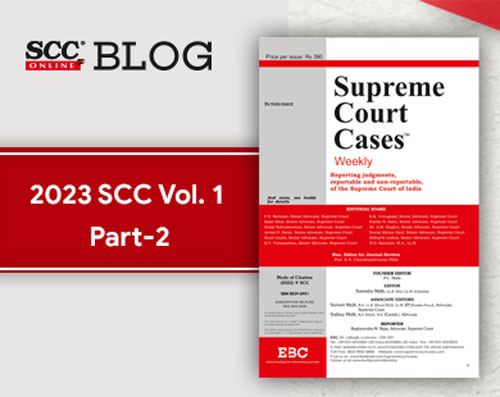Central Goods and Services Tax Act, 2017 — S. 174(2)(c) — Scope of: First part protects any right, privilege, obligation, etc. under the amended Act or repealed Acts. Proviso thereto provides that any tax exemption granted as an incentive against investment shall not continue as a privilege if the said notification is rescinded on or after the appointed day. [Hero Motocorp Ltd. v. Union of India, (2023) 1 SCC 386]
Civil Procedure Code, 1908 — Or. 33 and S. 11 — Application to file suit as indigent person: Legality of refusal of application to file suit as indigent person, on ground of res judicata and lack of cause of action, determined. Order that may be passed and remedy available to applicant-plaintiff on rejection of application to sue as indigent person, explained, upon analysis of Or. 33. [Solomon Selvaraj v. Indirani Bhagawan Singh, (2023) 1 SCC 349]
Companies Act, 2013 — Ss. 271 and 468 — Advertisement of petition for winding up: The requirement to advertise a petition for winding up does not flow out of the statute but flows out of the Rules and since the requirement to advertise a petition for winding up is stipulated in Rr. 5 and 7 of the Companies (Winding up) Rules what is prescribed in R. 35 of the NCLT Rules, 2016 would cover even petitions for winding up. Applicability of Test of prejudice, explained. [Devas Multimedia (P) Ltd. v. Antrix Corpn. Ltd., (2023) 1 SCC 216]
Criminal Procedure Code, 1973 — S. 319 — Summoning of additional accused: Guidelines that need to be followed by courts while exercising powers under S. 319, laid down. [Sukhpal Singh Khaira v. State of Punjab, (2023) 1 SCC 289]
Criminal Procedure Code, 1973 — Ss. 438 and 173(2) — Anticipatory bail: Matters to be considered for grant of anticipatory bail, enumerated. In case of multiple accused, there is need to consider individual role of each accused and nature of allegations against each of them. [CBI v. P.S. Jayaprakash, (2023) 1 SCC 314]
Foreign Trade, Export, Import and Investment — Policy/Policy decision/Policy-making — Exim Policy — Grant of incentives/benefits under: Exporter exporting ineligible items under relevant Exim Policy, denied benefit of additional licence, valid. Promissory estoppel, held, cannot be invoked, where there is change in policy decision about grant of incentives/benefits. Further held, erroneous grant of benefit to other exporters/exports would not entitle appellant to the same benefits. [Chowgule & Co. Ltd. v. Asstt. Director General of Foreign Trade, (2023) 1 SCC 320]
Insolvency and Bankruptcy Code, 2016 — Ss. 238-A and 7 — Applicability of S. 18 of the Limitation Act i.e. acknowledgment by corporate debtor of liability to pay debt: Provisions of S. 18 of the Limitation Act are applicable to proceedings under the IBC. Further held, an acknowledgement in a balance sheet without a qualification, can furnish a legitimate basis for determining as to whether the period of limitation would stand extended, so long as the acknowledgment is within a period of three years from the original date of default. Whether or not the acknowledgement in question is without any qualification or caveat, has to be determined the facts of each case. [SBI v. Krishidhan Seeds (P) Ltd., (2023) 1 SCC 209]
Insolvency and Bankruptcy Code, 2016 — Ss. 238-A and 7: Opportunity to amend pleadings for incorporating plea of acknowledgment of debt by debtor by virtue of its balance sheets, so as to seek the benefit of S. 18 of the Limitation Act, 1963, when may be granted, explained. [SBI v. Vibha Agro Tech Ltd., (2023) 1 SCC 286]
Prevention of Corruption Act, 1988 — S. 19 — Sanction for prosecution: Though opinion of CVC is only advisory, it is nevertheless a valuable input in the decision-making process of the appointing authority. However, the final decision of the appointing authority must be of its own, by application of independent mind. [Vijay Rajmohan v. CBI, (2023) 1 SCC 329]
Specific Relief Act, 1963 — Ss. 10 and 14(1)(a) (as amended by 2018 Amendment Act) — Nature and effect of 2018 Amendment: The amended S. 10 is prospective in application, as the amended S. 10 is substantive in nature. Further held, S. 10 has been converted into a mandatory provision by the amendment, prescribing power the courts have to exercise when the requisite ingredients are fulfilled. [Katta Sujatha Reddy v. Siddamsetty Infra Projects (P) Ltd., (2023) 1 SCC 355]








Great